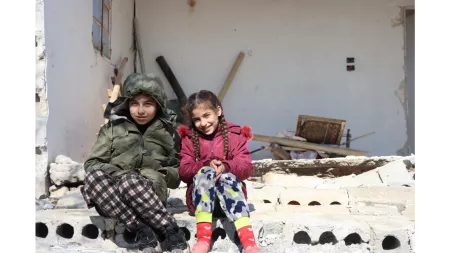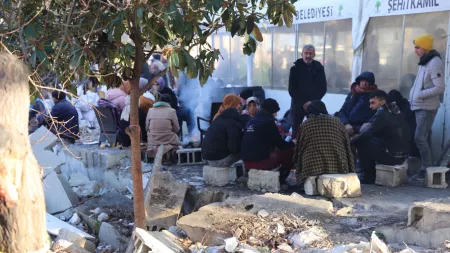Three months after the horrific earthquakes of February 6 in Türkiye and Northwest Syria, resulting in over 60,000 deaths, thousands of injuries, and massive damage to infrastructure, the humanitarian needs across the earthquake affected region remain acute.
“What we are witnessing in the earthquake affected areas in Türkiye and Northwest Syria three months after the 6th of February, is devastating. Thousands of people have lost their lives, while millions of others have lost their homes, assets, and livelihoods.
In Northwest Syria, this earthquake is a tragedy atop a tragedy, which will only magnify the existing needs of millions of displaced persons. I remain concerned about the devastating impact of the earthquakes especially on women and children, who are now more heavily reliant on humanitarian aid to cover daily needs such as food, water, and shelter. Persisting issues such as water shortages and lack of adequate hygiene facilities across the earthquake zone pose significant health risks especially for those residing in informal camps”, says Sherine Ibrahim, Country Director of CARE Türkiye.

It is estimated that more than 500,000 houses in Türkiye have been determined as requiring urgent demolition, collapsed, or severely damaged; while the economic damage for the houses impacted alone, is 54.7 billion USD. In Northwest Syria, more than 10,600 damaged buildings have been recorded and there is a minimum of 650,000 cubic meters of building debris that need to be removed.
In Türkiye, 2.3 million people have been identified as living in formal and informal settlements across earthquake affected areas. Out of this number, 1.6 million have been identified to be living in informal settlements or in rural areas close to their destroyed homes. In Northwest Syria, the earthquakes have added a crisis on top of a crisis for people who were already reeling from 12 years of conflict. Since the start of 2023, at least 4.1 million people in Northwest Syria rely on humanitarian aid to meet their most basic needs.
“Given the scale of the disaster in Türkiye and Northwest Syria, it will take months and years to help people recover. We will do everything in our power to avoid the further deterioration of an already catastrophic situation, by helping people to return to safe homes and to rebuild their lives once again,”ends Sherine Ibrahim.
The consequences of the earthquakes have deteriorated drastically an already precarious humanitarian situation for people in both Türkiye and Northwest Syria, who already suffered from inflation and a fragile food security in the region. At the same time, the pre-earthquake cholera outbreak in Syria remains a severe public health threat, which together with an extremely burdened healthcare system after 12 years of conflict, form the perfect storm for an outbreak of multiple crises in the region.
CARE's response
In this fragile context, CARE remains committed to continue responding to increasing humanitarian needs. So far, our teams and partners have reached more than 37,000 people in Türkiye and more than 570,000 individuals in Northwest Syria through food, shelter, water, sanitation, hygiene and protection activities, focusing on informal settlements that house people in the most affected provinces of South-central Türkiye and on camps and communities hosting large numbers of internally displaced people in Northwest Syria. CARE supports partner organizations in Northwest Syria with rubble removal activities and lending support to the operation of existing water stations to restore water networks.
